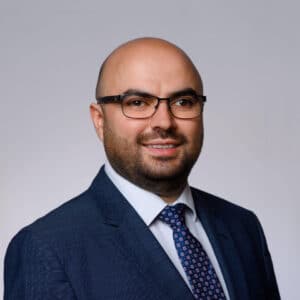New skilled labor immigration law 2023
The Skilled Worker Immigration Act of 01 March 2020 introduced many changes to German residence law, including the accelerated skilled worker procedure and the job-seeking visa. Now, with a resolution of June 23, 2023, the Bundestag has adopted a draft law by the German government that further develops the existing rules on skilled labor immigration, thus giving the old law of 2020 an update. But what do the changes look like in detail?
Your contact
Shahroch Taleqani
Change: EU Blue Card
Currently, the EU Blue Card is subject to a minimum salary threshold of two-thirds of the annual assessment threshold for general pension insurance. The new law lowers this lower limit to 50 percent of the annual assessment threshold, i.e. to just 43,800 euros gross for 2023. For shortage occupations, for which a lower limit of 52% of the annual assessment ceiling previously applied, the new limit is now 45.3%, i.e. only EUR 39,682.80 gross for 2023.
In addition, the list of shortage occupations will be significantly expanded. In future, veterinarians, pharmacists, teachers or nurses, for example, as well as managers in logistics and in child or elderly care will also be able to benefit from the lower salary threshold - provided their degree is at an academic level. The same lower lower limit is now also to benefit career starters who graduated less than three years ago at the time of application.
However, the new minimum salary thresholds for the EU Blue Card will only apply after the Act on the Further Development of Skilled Immigration comes into force, i.e. from November 18, 2023. Before this date, the previous, higher minimum salary thresholds for 2023 will remain in place.
Family reunification with Blue Card holders will also be improved. In the future, requirements such as proof of sufficient living space or of securing a livelihood will no longer apply to latecomers. At the same time, the group of persons to whom family reunification is to be possible will be expanded to include the parents and - if the foreigner's spouse resides permanently in Germany - even the foreigner's parents-in-law.
Professionals who have been issued an EU Blue Card by other EU member states will also face changes. From the time the law comes into force, they will be allowed to stay in Germany for up to 90 days for business purposes without first having to apply for a visa or a work permit. If they have spent more than twelve months with their Blue Card in the EU member state that issued it to them, they can then move to Germany more easily. To do this, they will no longer have to apply for a visa at the foreign missions, but will only have to submit an application to the relevant foreigners authority in Germany.
Change: IT specialists
The further development of the Skilled Immigration Act will enable IT employees without a university degree to gain access to the EU Blue Card in future. The prerequisites for this are at least three years of relevant professional experience in the last seven years, demonstrable theoretical knowledge at the level of an academic education and a gross annual salary above the threshold for shortage occupations of 45.3 percent of the annual pension contribution assessment ceiling. This should be a great relief in practice: By taking the Blue Card route, IT specialists will in future be able to avoid the requirement of German language skills, which is still a prerequisite for a visa for IT specialists.
Work experience instead of comparable degree
In future, it will be easier for foreigners to work in Germany, even if their vocational training is not recognized as comparable here. The new Skilled Immigration Act (2023) stipulates that in future, foreign graduates of at least two years' training who are recognized by the state in the country where they trained can also come to Germany as skilled workers. The same applies to university graduates whose degree is recognized by the state in their country of origin. For all of them, the requirement of comparability with a German qualification will no longer apply.
The new law also creates the possibility of a so-called recognition partnership. This is intended to allow skilled workers to begin the procedure for recognition of their training in Germany while already in employment. To this end, the foreigner and their employer must conclude an agreement in which the foreigner undertakes to seek recognition without delay and the employer guarantees to enable participation in the necessary training measures.
However, a new salary threshold is introduced as an additional requirement in the Employment Ordinance. If the foreigner's salary is below this threshold of 45 percent of the annual assessment limit in the general pension insurance scheme, then there is still no way around official recognition of the training as comparable to a domestic qualification.
Opportunity Card
Another significant change in the Further Development Act is the introduction of an opportunity card in Section 20a of the Residence Act. This new residence permit is to be issued according to a system in which applicants can collect points for qualities such as good German or English language skills, professional experience or great potential in their partner or spouse. With six or more points, an opportunity card can be issued that allows its holders to stay in Germany for a year, work up to 20 hours a week and also pursue trial employment. This is intended to ensure that holders of an opportunity card can seek permanent employment in Germany and stay here while their professional qualification is being recognized.
Skilled workers can also apply for an opportunity card; the points system does not apply to them. However, the opportunity card is only issued to foreigners whose livelihood is secure and who can present at least a successful two-year vocational qualification. Foreigners who are already in Germany can also apply for an opportunity card, but only if they are in possession of a residence title for employment or training.
Western Balkans Regulation
In addition, the Act on the Further Development of the Western Balkans Regulation from Section 26 (2) of the Employment Ordinance (BeschV ) is no longer valid and doubles the quota of residence titles available through it. It will therefore apply permanently in the future and enable 50,000 nationals from the Western Balkans to work in Germany each year, regardless of their qualifications.
Other changes
Probably the most significant change for practitioners in the new Further Development Act is that skilled workers will be able to work in any qualified occupation in future. The link between the field of activity and the qualification obtained no longer applies.
In addition, skilled workers with vocational training or academic qualifications are to be entitled in future to be granted a residence permit under Section 18a or Section 18b of the Residence Act. The old wording, according to which they "may" only be granted the permit, will be replaced by a more specific wording that does not give the authorities any discretion. In the future, it will read: a skilled worker "shall be granted a residence permit [...]."
Furthermore, from the time the law comes into force, it will be possible for skilled workers to apply for a settlement permit after just three years of residence and not after four years, as was previously the case. For holders of an EU Blue Card, the required period of residence will also be reduced from 33 months to 27 months, provided that they have been employed as an academic specialist throughout this period. In the case of language skills at a level of B1 or higher, the minimum period of residence remains at just 21 months, as before. It will also be easier to obtain a permit for permanent residence in the EU. In future, skilled workers will be able to count periods during which they held a Blue Card or another residence title for skilled workers or for studying in another EU member state towards the five years of residence in Germany required for this purpose. Periods of residence in other member states of the Union as a beneficiary of international protection can also be credited. This makes it easier for skilled workers to consolidate their residence in Germany and creates long-term prospects for staying.
It should also be possible to change the purpose of residence in more cases in future. Existing bans on changing the purpose of residence will no longer apply, particularly for foreigners in possession of a residence permit for the recognition of foreign professional qualifications, and largely also for stays for training or study purposes. This will make the transition from training to work considerably easier and make the right of residence more flexible. Recognition is also to be facilitated by the creation of so-called recognition sponsorships. This is intended to enable companies to employ people with foreign qualifications and catch up on their training recognition procedures within three years. However, the rules for recognition procedures will also be relaxed beyond these sponsorships. In future, it will be possible to stay for up to 24 months instead of the previous 18 months to complete recognition or adaptation measures, and those waiting for recognition will be allowed to work 20 hours per week instead of 10.
Asylum seekers who entered the country before March 29, 2023, and who have a relevant professional qualification will be allowed to terminate their asylum procedure by withdrawing their application and instead apply for a residence permit as a skilled worker. The requirement of prior departure and visa application shall be waived.


